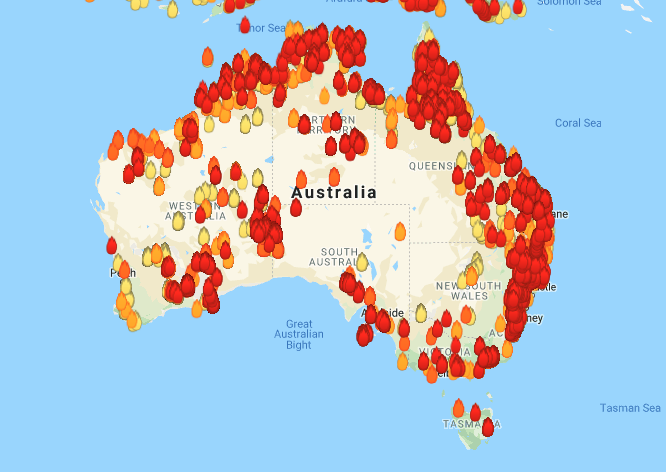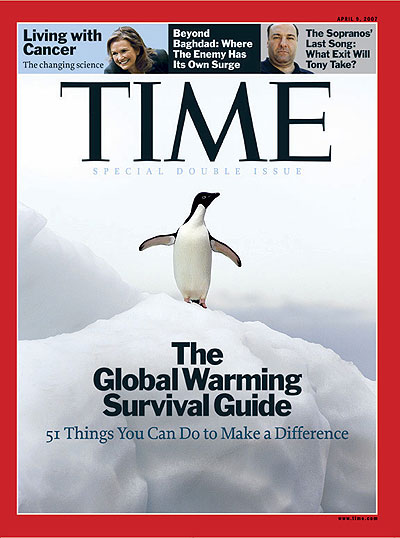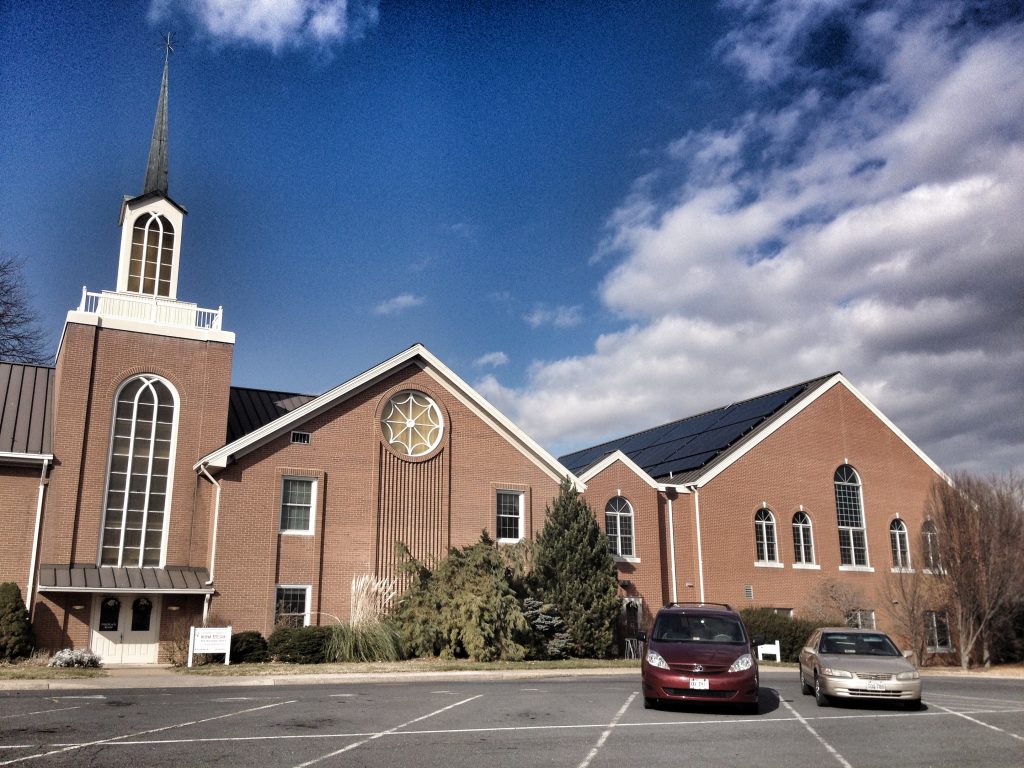In a recent sermon at Park View Mennonite Church the focus was on our impacts on the environment and the need for our action. Questions were posed about how each of us matter in this challenge. How can each one of us make a difference? How can each one of us create solutions? How can each one of us do better? My favorite quote from this sermon by Moriah Hurst is “We need to figure out how to respect the fragile balance of life on earth.” This is true in all aspects of life, but so true as we face changing climate patterns.
Here is her sermon, I hope it moves you as it did me.
When I step off a plane in Australia one of the first things I do is breathe deeply. The smell of heat and sand, of gum trees and blossoms normally hangs thick in the summer air. If I would have stepped off a plane this week in Sydney, where my parents live, and breathed deeply, I would have started coughing and choking. The air is full of smoke. 140 fires stretching over two states and two million, five hundred thousand acres of burning land. Maps showing the rating of fire danger have created new categories above extreme fire danger, now listing some areas as under catastrophic danger. Fires are not uncommon in Australia, but these fires are massive. How did this happen? 3 very dry years, poor prevention and a lack of Governmental recognition that climate change is happening and thus resistance to acting in ways to counter these effects.

Stories like this are all too familiar. We know about droughts, heatwaves, flooding, extreme storms, sea level rise, and the loss of species. No longer do we have stable season and predictable weather patterns. We have altered the composition of the atmosphere. I’m drawn to the language of the Prophet Isaiah who talks about the land being utterly broken, torn, violently shaken, it staggers like a drunkard, sways and it falls never to rise again. Is this where things are at with our earth?
When we were just starting to think about moving everything out of the church building a year and a half ago for the renovations, I had an epiphany moment during staff morning prayers. The country we prayed for that morning was an island in the Pacific that needs to relocate its entire population because with rising sea levels. They need to evacuate their whole island. This gave me a bit of a reality check, as I was freaking out about moving out of every room of the church, a whole country was thinking about moving their entire population because the land they lived on was being taken by the rising sea.
In our sermon series this fall we are not politely shying away from these realities. Even though speaking of these things can make us distressed and anxious. “Katharine Hayhoe, a climate scientist at Texas Tech University, says, ‘The most important thing you can do about climate change is talk about it.” Leader p. 30. We know there is need to change our attitudes and lifestyles. We need to figure out how to respect the fragile balance of life on earth. So we remember that the earth belongs to God yet we are called to care for it and not destroy it.
We need communal spaces to talk about our collective grief, and express our honest lamentation before God. We have gratitude for what God has created, knowing that God hears the cries of creation and responds to our wounded world. We confess our part in bringing the earth towards the brink of catastrophe – sometimes through our willful ignorance. And we name that we follow a God who longs to reanimate our actions with hope. So in following that God we need to not allow ourselves to get stuck here in thinking we can’t do anything.
When I lived in Melbourne, Australia I shared a house with my friend Jess. One evening I made a dip to take to a party and instead of transferring it into a plastic container, I left it in the ceramic mixing bowl I’d made it in and covered it. I placed the bowl with my chips in a cloth bag and had them sitting on my lap as I rode on public transport to the party. When I stood up to get off the tram I thought I had the bag strap over my shoulder so I was not holding the bottom of the bag. It slipped off my lap and the bowl loudly shattered as the dip started seeping through the bag. I was upset at myself for making a stupid mistake, annoyed at the waste of food but more then that I was terrified to tell Jess because it was her bowl. It was an antique, not a family heirloom but a match to another bowl that I knew Jess loved. I felt sick knowing that I needed to tell her right away and that she would be upset and possibly angry with me. I messaged her expressing my regret and telling her how sorry I was but I was never able to find another bowl to replace it.
Do we come to God with this kind of repentance? Holding out the earth saying “We have broken this”.
Are we willing to admit it and take responsibility? What are we doing to restore both what is broken and our relationship with God?
God is in all and through all of creation. Hubert Reeves a Canadian-French astrophysicist says (and please excuse the sexist language) “Man is the most insane species. He worships an invisible God and destroys a visible Nature. Unaware that this Nature he’s destroying is this God he’s worshiping.”
This past February while I was at a conference at the Anabaptist Mennonite Biblical Seminary I listened to lectures and conversations around racism. As we wrestled with what kind of change we needed to bring in our congregations and communities, one of the speakers challenged us. If we really deal with this it will hurt us, we need to feel the hurt so that it pushes us to change. The speaker went on to say that unless it hurts us some, unless we are giving up some of our privilege, then we are not really doing the change we need to.

This is true with our earth and climate change as well. We can put a Band-Aid over the pain. We can turn off the news, turn away from the devastation. But really we should be owning that we are not the victims in this but claiming our part as the perpetrators. Job, James and Luke were all yelling at us today. Pointing out our wealth and how we may be holding it for ourselves and thus inflicting pain on our world and others. Have we mistreated the poor of the earth so much that we are rotten enough that worms find us sweet? Are we doing slow violence against our world and our international brothers and sisters? Pastor Doug Kaufman writes that “the poor who experience the most impacts (of climate change) often have the lowest emissions” Leader p.11. And Mark Bigland-Pritchard writes in agreement saying “Global justice demands even tougher targets for wealthy industrialized countries, which have benefited most from the fossil economy and generated most of the emissions” Leader p.4.
While other writers go even further saying “The extent of human-created damage to the planet is stupendous – an ecological violence of World War scale. Let’s say that we humans are at war with (the rest of) nature.” Leader p.17 Randoloh Haluza-DeLay.
Hearing the blessings and woes read from Luke’s gospel I have to wonder are those woes intended for us? Do we shrug off the poor thinking that eventually they will be blessed? Looking at the state of our world it is not a matter of pulling the poor and impoverished of the world up to where we are. I had a friend who joked that he hadn’t realized that becoming Christian meant becoming middle class, but that was what he was being pressured to do. Our world cannot sustain our level of consumption. We must use less. And for those of us who are consuming much more then other regions of the world that change needs to look drastic.
Katherine Jameson Pitts writes “Changing climate intersects with many things we care about – anti-racism, immigration, poverty, health care, and the welfare of future generations.” Leader p. 30. The attack on our earth and its atmosphere is at the root of many systems we pray for every week. For instance “The conflict in Syria has been convincingly linked to a record period of drought, which caused both food shortages and mass migration into the cities.” Leader Mag. P 4.
This is not a new thing for us to be hearing but what do we need to hear for this to motivate us to action?
Because we get stuck here. Our guilt and anxiety pinning us to the floor. Yet we also have to name our privilege, power and wealth. The other week someone ran out of the service just before we finished and counted the number of cars in our parking lot. How many of us live in walking distance and drive to church? I’m guilty of that! Our privilege shows up even in the ways we approach climate change, we have the wealth to put solar panels on our houses and buy electric cars.

How do we not get stuck? We don’t just want to rush to activism that leads to burnout and energy that fizzles. What are sustainable steps towards sustainability? On a personal level I was challenged to take away plastics from my house one room at a time – when something runs out don’t replace it with plastic. I have learned from those who teach mindfulness that the best practice for you is the one that you do. I appreciate this perspective from the Dalai Lama “The planet does not need more ‘successful people’. The planet desperately needs more peacemakers, healers, restorers, storytellers and lovers of all kinds.”
This morning we are called back to the commission God gave us to till and keep the land. We need to convert our actions from pushing the earth to produce for us to embracing our call to serve and preserve the land. We are well placed as the church, and particularly as a peace church, to do this work. When I work with young adults to discern where they are going in their lives we often look at their gifts and what they are passionate about. I will often use the phrase, “use your superpower for good”. What are the gifts we have as a church that are exactly what our world needs right now? For one, we are not disconnected, we are not just individuals trying to act alone but a group having this conversation. We need to move from an idea of stewardship to caring for creation and then expand it to making peace with all of creation. We are neighbors to the rest of creation. What would it look like for us to seek the dignity and well being of all creation.

Beyond our solar panels what is our next step as a congregation? How are we empowered to action together? Is it to push for city planning so that we make spaces for bikes and move towards not being so reliant on cars? Should we return to the concept of enough. How much do we really need? Embrace Sabbath practices of rest, gratitude and Jubilee redistribution. In listening to the Shifting Climates Podcast I’ve heard many things that have stuck with me. One speaker took and quote I know well and expanded it. She said if you want to go fast, go alone. If you want to go far, go together. But with climate change there is a need for us to go fast together.
We need to go forth and talk. Can we embrace a prophetic voice so that we don’t just talk to each other but to the larger world. How are we proactively generating ideas to honor God’s earth and the people whom God created. We are called from passivity and domination to engagement and action. Creative and diligent action. Derrick Jensen writes “It is long past time for us to be the miracle we’ve been waiting for.”
And as we speak and act, we remember. The universe began and will end with God’s word. We are not alone in this. Will we commit to seeking God’s inspiration and guidance for our actions and our world. Commit to the deep pray of consulting with the creator and true owner of the world – of listening to God and waiting on the inspiration of the holy spirit. May God grow in us a prayer-infused hope.
This morning what would it mean for us to repent, be transformed by the love of God and deny ourselves, pick up our cross and follow Jesus.




